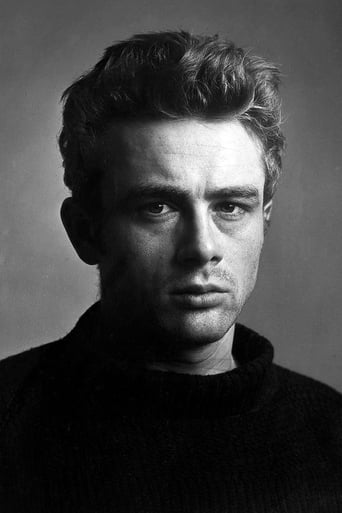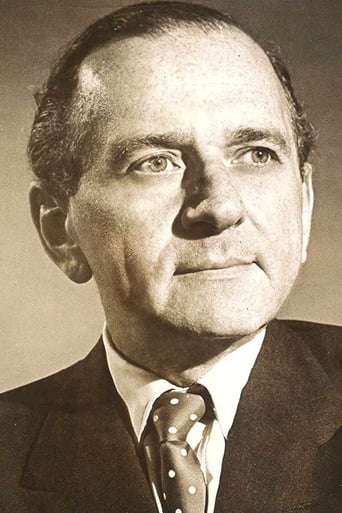Spidersecu
Don't Believe the Hype
Konterr
Brilliant and touching
filippaberry84
I think this is a new genre that they're all sort of working their way through it and haven't got all the kinks worked out yet but it's a genre that works for me.
Adeel Hail
Unshakable, witty and deeply felt, the film will be paying emotional dividends for a long, long time.
bandw
If you know anything about James Dean, then this movie will probably not add much to your knowledge. What we see of Dean is mainly through still photographs. Most of these are just portraits that add little to the film, but there is an occasional one that surprises, like a nice one of Dean enjoying himself in a ballet class. The scene of real interest, which is saved for the end, is from a black-and-white audition Dean did for "East of Eden."The tone of the narration would be appropriate for the biopic of a saint--you are made to think that Dean's early death was some sort of national calamity. There are several interviews with some of Dean's relatives, friends, and even some restaurant owners and taxi drivers. The depth of the questioning is often inane, such as when the interviewer asks the restaurant owners, "How was his appetite?" We watch as a previous friend rummages through a box of Dean's miscellaneous stuff like phone numbers and a note from his laundry. It seems that everything that Dean touched was sacred. We don't even get any insights from Dean's girlfriend, the one with whom, "for the first time he found the timid belief that life was possible." The most frustrating thing about this film is the narration's constant speculations about Dean's motivations and thoughts. For example, consider this, "He took his envy to the beach. He looked at the ocean and he was jealous of its power. He envied the gulls for having found each other. He envied them their freedom and their solitary flights. Suddenly he knew that as an actor he could be the ocean and flood everything with his power. As an actor he could be a gull." A good part of the movie is filled with such florid prose that has no basis in fact. Amid all of the speculations there is none about the common one of Dean's being homosexual, or bisexual. He supposedly avoided the draft by registering as a homosexual.The main question I have always had about Dean is the extent to which he manufactured his own myth of being the sensitive, misunderstood, moody, independent intellectual. This film got me no closer to answering that.
wes-connors
"The James Dean Story" is introduced as "A different kind of motion picture," explaining, "The presence of the leading character in this film has been made possible by the use of existing motion picture material, tape recordings of his voice and by means of a new technique - dynamic exploration of the still photograph." The only "tape recordings of his voice" noteworthy is one short recording Mr. Dean make while visiting his family in Indiana; he wanted to record any family recollections of his great-grandfather Cal Dean, intrigued because he played a similarly named "Cal" in "East of Eden". Dean asks if Cal Dean was interested in art, and learns the relative was an auctioneer. James Dean was interested in art and had warm relationship with his family, obviously. That's the only 100% accurate revelation in this documentary. James Dean was interested in art and had warm relationship with his family.An amazing "screen test"/"outtake" from "East of Eden" appears near the film's end. It's a black and white scene between Dean (as Cal Trask) and co-star Richard Davalos (as Aron Trask). Dean is at his mesmerizing best. If this scene appeared only here, and no "East of Eden" film was completed, this documentary would be an essential, high rated film. But the scene, a perfect "10" in isolation, should be considered an "East of Eden" extra. Dean's "Traffic Safety Film" is also worth seeing.There are the expected interviews with family and friends. My favorites were the guy (Lew Bracker) going through a box of stuff Dean left with him, and Dean's family. There wasn't enough from Aunt Ortense and the letter from Dean to his little cousin was very nice. More reading of Dean's letters would have been welcome. Dean's unidentified writer friend seemed to have a better thesis for the film; filmmakers might have considered developing it as a main focus.Robert Altman's direction of Martin Gabel's reading of Stewart Stern's script is dreadful. What were they thinking? Perhaps, filmmakers can be forgiven due to the closeness of Dean's passing. Don't expect "The James Dean Story" at all. This movie is more about Dean's effect on people (both the fans and filmmakers) than the man. It is very clearly an early piece of the James Dean myth-making "legend". Tommy Sands sings "Let Me Be Loved". The narrative refers to Dean as "He" with a god-like air. The shots of Dean's family seeming to "know" the moment he dies are truly wretched.** The James Dean Story (8/13/57) Robert Altman ~ James Dean, Martin Gabel, Richard Davalos
hrayovac
Perceptions will vary wildly about this film and may parallel some misunderstandings of who Dean was: Unless you have an intuitive view, you might think of Dean as arrogant or standoffish...the icon you see in posters of "rebel". In reality he was shy, tender, yet very driven to constant self-exploration. This documentary, shot not long after Dean's passing, successfully tells his story through his real friends and family. Hollywood apparently no longer aspires to make this kind of honest film without the sensationalism and innuendo heaped in for "box office". Back in '57 folks didn't cry on cue just to prove the depth of their sentiments while being interviewed. Yet one can plainly feel the love felt and the deep impression Dean made on those around him. Altman and George reveal that the "rebel" aspect attributed to Dean was not some sort of love of violence (a la today's Pulp Fiction), but was Dean's expression of loneliness and search for acceptance...much like the character Cal in East of Eden.
arneblaze
This 1957 documentary was thrown together to capitalize on the Dean legend and hopefully cash in on it. Out of luck - even Dean's ardent fans avoided this turkey. Using still photography and a morose narrator, Martin Gabel, this contains little useful information not already known about Dean. Interviews with family and neighbors back home shed little light - they are so terminally dull and brimming with flat affect, one is astonished that Dean's fluidity of expression and sensitivity grew out of this environment. Of some value is an outtake from EAST OF EDEN (presented here in dimly lit black and white) between Dean and Davalos. It's a gruelling 82 minutes.

